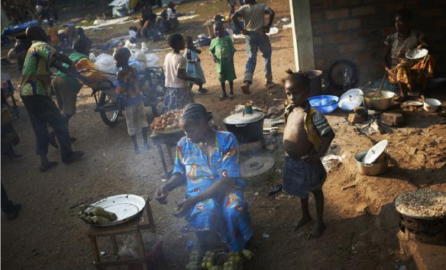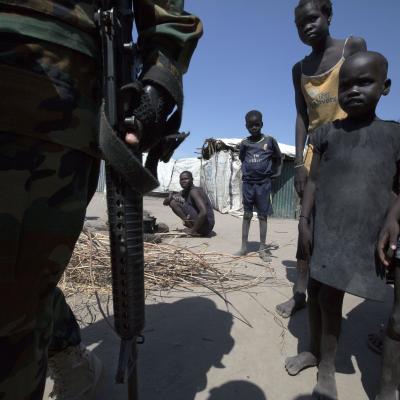Linking urgent humanitarian aid with long-term development assistance will be central to a first-of-its-kind Trust Fund organised by the European Commission to mobilise international donors in the Central African Republic (CAR).
The Bêkou Trust Fund – named after the local Sango word for “hope” – will initially provide €64 million for projects on food security, health, urban renewal, women’s rights, and support for refugees returning from Cameroon.
In July 2014, when the Fund was created, there were 357 000 refugees from CAR in neighbouring countries and 542 500 internally displaced people, according to the United Nations High Commissioner for Refugees (UNHCR). The country has endured two years of violence between Christians and Muslims as well as within the largely Muslim Séléka rebel alliance, which seized power in March 2013. Since January 2014, the non-aligned Catherine Samba-Panza has been interim President, with elections due in February 2015.
“From the EU side we worked with three different presidents, three different prime ministers and many, many different ministers,” said Peteris Ustubs, Director for West & Central Africa at the European External Action Service. “This does not help us in terms of long-term planning, political relationships, seeing how the activities might be planned and how the political process might move forward.”
The provisions of the Bêkou Fund allow donors to act fast, with the first projects expected to begin before the end of 2014. Pierre Amilhat, Director for West & Central Africa at EuropeAid, said the Fund had been designed this way to show locals that the international presence in the capital Bangui was bringing “tangible results straight away; that something is happening”.
In traditional development assistance projects, Mr Ustubs said “it might take up to six or even nine months before the physical arrival of financial means. Here we are talking about probably two months as the maximum.”
The aim is to pool resources to make the most of available expertise and reduce bureaucracy. So far contributions have come from the European Union (€41 million), France (€10 million), Germany (€10 million) and The Netherlands (€3 million), but the Fund is open to anyone.
According to Irchad Razaaly, the EuropeAid manager of the Bêkou Fund, non-governmental and non-European actors, public or private, are also welcome to participate. “This seems to me like an innovation compared to what the international community is usually able to implement in these kinds of situations,” Mr Razaaly said.
Jean-Louis de Brouwer, Director of Operations at the European Commission's Humanitarian Aid and Civil Protection department (ECHO) said the chosen projects allowed the EU to implement a kind of “humanitarian-Plus”.
“To develop projects that go a bit further than urgent humanitarian support, traditionally understood, because at the moment no one can fill the gap.”
The concept of Linking Relief, Rehabilitation and Development (LRRD) emerged in the 1980s and was encapsulated in a European Commission Communication in 2001.
In the case of CAR, Mr Amilhat said the aim was to go beyond purely humanitarian assistance as soon as possible. “That is, to get out of ‘substitution’, which is put in place when the state is no longer able to fulfil its basic functions in health and education…”
In similar situations in the past, Mr Razaaly said there has been a lack of coordination between donors, particularly in the transition between the humanitarian phase, the recovery phase, and the development phase.
As the European Commission website on the Fund explains: “Experience has shown that the weakness of the national or local administrations combined with a sudden increase in the number of donors leads to disorganisation and a fragmentation of the response of the international community, thus hampering an effective and sustainable contribution to the reconstruction of a country.”

Marcellin, 29, cooks manioc parcels to sell while her daughter Florent stands by... UNHCR / S. Phelps / December 2013
So could a similar instrument be used elsewhere? For Mr Ustubs the appeal of being able to act quickly while keeping in mind long-term development objectives is clear, particularly in such fragile situations as CAR. However, he warned the Bêkou Fund must be helped to grow financially and then evaluated before being replicated.
“We might fall into the temptation to have a proliferation of such an instrument everywhere. That might be a wrong move as well,” he said.
In Mali, for instance, the EU also acted quickly but chose budget support as the most effective means of delivering aid. Since a donor conference in May 2013, 80 % of the promised funds from the EU have been delivered.
However, Mr Ustubs said budget support on the scale used in Mali would be much more difficult in CAR.
“In very fragile states other instruments should be used and […] probably the European Trust Fund might be one of the ways the EU will move forward with our development assistance.”
|
The EU in CAR The EU has committed more than €360 million of new funding to respond to the crisis in CAR since it unfolded in 2013. The EU has also provided over the years development assistance to meet the basic needs of the most vulnerable people. Between 2008 and 2013, around €225 million were allocated through the different financial instruments (€160 million through the 10th European Development Fund (EDF) and €65 million through the EU budget). For more information see: http://eeas.europa.eu/statements/docs/2014/140317_02_en.pdf |
|
Learn more… One of the organisations receiving support from the Bêkou Trust Fund in CAR is the International Rescue Committee. Learn more about their programmes aimed at ‘Protecting Women and Girls in the Central African Republic’ in our recent Voices & Views here. Further exchange on external assistance in fragility and crisis situations on capacity4dev.eu : http://capacity4dev.ec.europa.eu/topic/fragility-crisis-situations |
This collaborative piece was written by the capacity4dev.eu Coordination Team. Teaser image of the capital, Bangui, courtesy of Kaylan Neelamraju.



(2)
Log in with your EU Login account to post or comment on the platform.
Tout d'abord, un grand merci à l'équipe de coordination pour cet article sur le fonds Bêkou. Pour plus d'informations concernant le nouveau fonds fiduciaire européen pour la République centrafricaine, nous vous invitons à visiter notre groupe via ce lien: http://capacity4dev.ec.europa.eu/trust-fund-bekou/dashboard, et à y échanger idées, pratiques et informations concernant le fonds Bêkou et les secteurs dans lequel il agit.
First of all, we would like to thank the coordination team for this article on the Bêkou Trust Fund. For more information about the new EU Trust Fund for the Central African Republic, we invite you to visit our group: http://capacity4dev.ec.europa.eu/trust-fund-bekou/dashboard, in order to exchange ideas, practices and information related to the Bêkou Trust Fund and the sectors in which it operates.